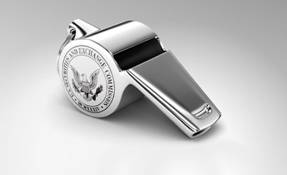SEC Chair Gives Big Shout Out for Whistleblowers

Photo Credit: sec.gov
By the C|C Whistleblower Lawyer Team
Yesterday, SEC Chair Mary Jo White spoke at Northwestern University Law School on the invaluable role of the corporate whistleblower and the still burgeoning SEC whistleblower program that she describes as a “game changer” for government enforcement. Here is her summary of the program’s many accomplishments since its inception nearly four years ago.
- Increasing Volume of Tips. The number of tips to the SEC Whistleblower Office continues to climb, having increased by more than 20 percent over the most recent year. For 2014, the SEC received over 3,600 tips (about ten a day), up from about 3,200 tips in 2013. And in the first quarter of this year, the numbers have increased again, by more than 20 percent over the same quarter last year.
- Increasing Quality of Tips. With the increase in tips has come a commensurate increase in the quality of the tips. As Chairperson White reports, “we also continue to receive higher quality tips that are of tremendous help to the Commission in stopping ongoing and imminent fraud, and lead to significant enforcement actions on a much faster timetable than we would be able to achieve without the information and assistance from the whistleblower.”
- Increasing Number and Size of Whistleblower Awards. A total of seventeen whistleblower awards have been made to date with total payouts nearing $50 million and the SEC’s highest award of $30 million made last fall. Chairperson White promises this trend to continue, highlighting her agency “issued more awards to more people for more money than in any previous year — and that trend is expected to accelerate.”
- Awards to Officers/Directors and Compliance/Audit Personnel. These individuals are not eligible for a whistleblower award unless they first report their concerns internally (and wait at least 120 days), or if they believe more immediate SEC disclosure is necessary to prevent imminent and substantial misconduct. Two awards have recently been made under both exceptions. In March 2015, the SEC made a $500,000 payout to a former company officer who waited the specified time. And just this month, the agency announced an award of more than a million dollars to a compliance professional.
- Strength of Internal Compliance Programs. The SEC whistleblower program has not undermined internal compliance programs as so many had feared. It has had just the opposite effect as “all indications are that internal compliance functions are as strong as ever — if not stronger — and that insiders continue to report possible violations internally first. With respect to those whistleblowers who are company insiders, more than 80 percent of them first raised their concerns internally to their supervisors or compliance personnel before reporting to the agency.
- Preventing and Punishing Retaliation. The agency has aggressively enforced the anti-retaliation provisions of the Dodd-Frank Act. In June 2014, it brought and settled its first whistleblower retaliation action against a hedge fund, securing more than $2 million in monetary sanctions, of which $600,000 went to the whistleblower. The SEC also has intervened in several private cases to argue the anti-retaliation protections of Dodd-Frank should apply whether the whistleblower reports internally or to the SEC.
- Preventing Anti-Whistleblower Gag Clauses. The SEC is going after companies that use agreements or other mechanisms to improperly stifle whistleblowers from coming forward. On April 1, 2015, the agency announced its first enforcement action in this regard, charging KBR Inc. with violating Rule 21F-17 because it required witnesses in certain internal investigations to sign these kinds of confidentiality agreements. The agency has also sternly warned against requiring employees to sign agreements mandating they forego any whistleblower award or represent, as a precondition to obtaining a severance payment, that they have not made a prior report of misconduct to the SEC.
In concluding, Ms. White wanted to make one thing perfectly clear. We should not fear whistleblowers. Rather, we should embrace them as a critical part of our enforcement scheme.
The bottom line is that responsible companies with strong compliance cultures and programs should not fear bona fide whistleblowers, but embrace them as a constructive part of the process to expose the wrongdoing that can harm a company and its reputation. . . . I would urge that, especially in the post-financial crisis era when regulators and right-minded companies are searching for new, more aggressive ways to improve corporate culture and compliance, it is past time to stop wringing our hands about whistleblowers. They provide an invaluable public service, and they should be supported. And, we at the SEC increasingly see ourselves as the whistleblower’s advocate.
Kudos to Chairperson White and the work she and her agency have done in furthering this Golden Age of the Whistleblower.
Tagged in: Importance of Whistleblowers, SEC Whistleblower Reward Program,